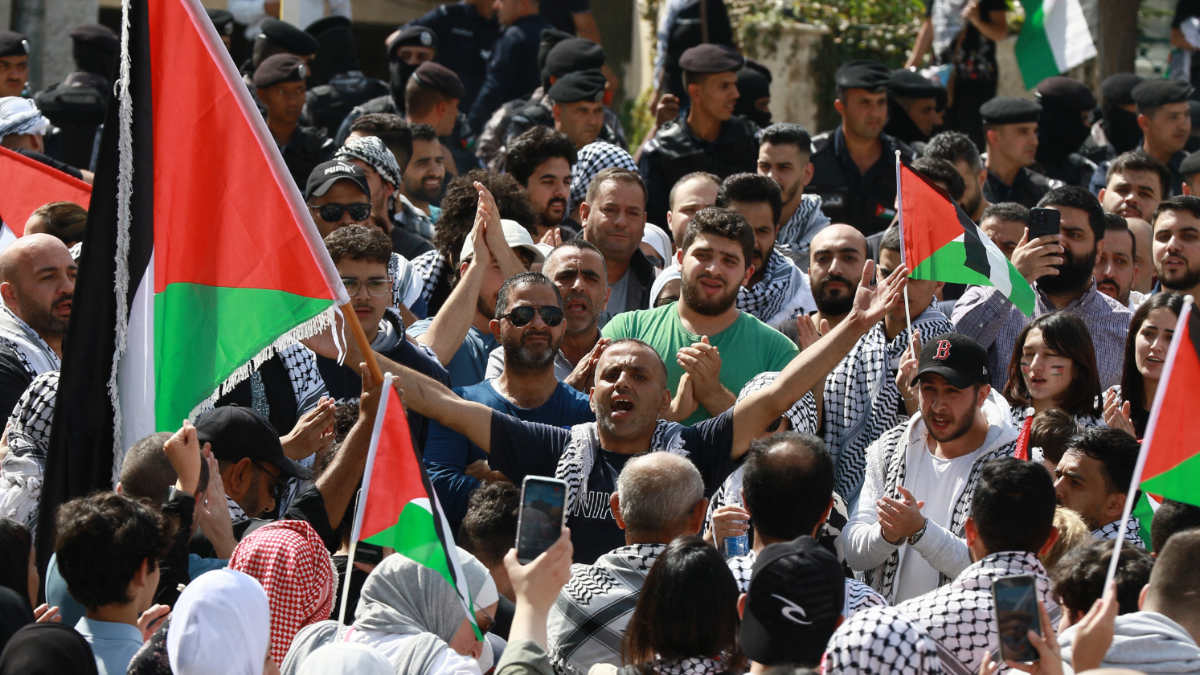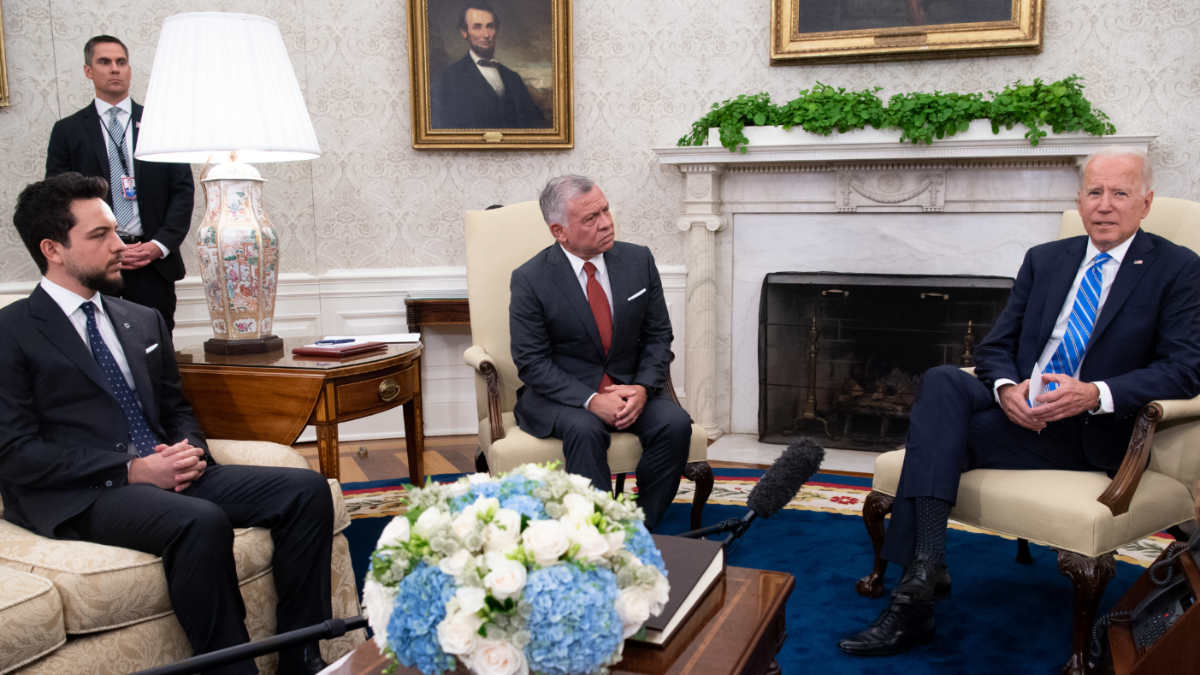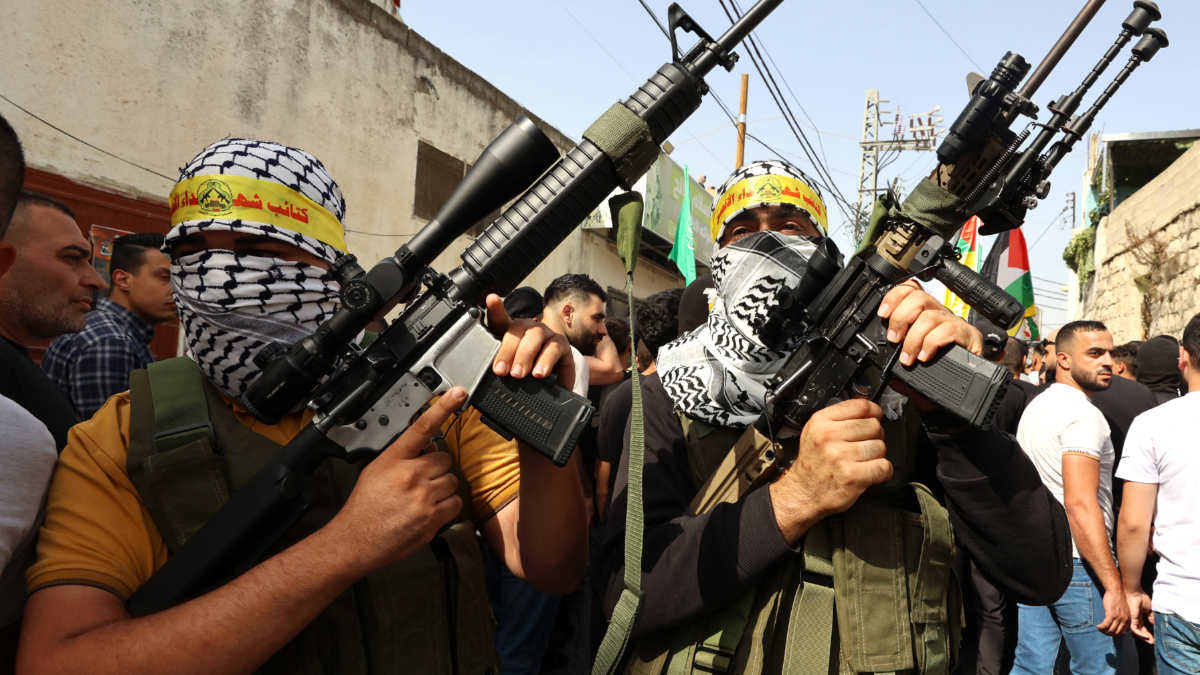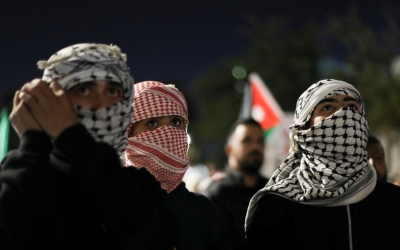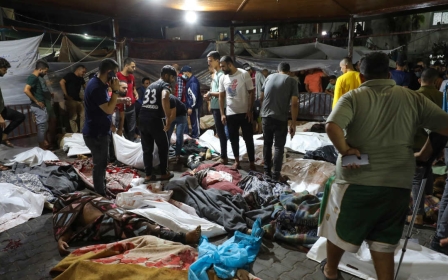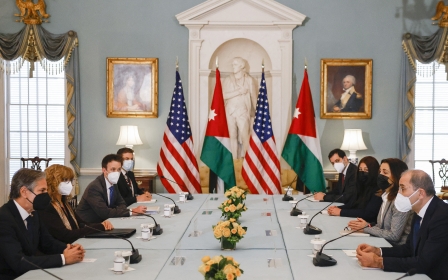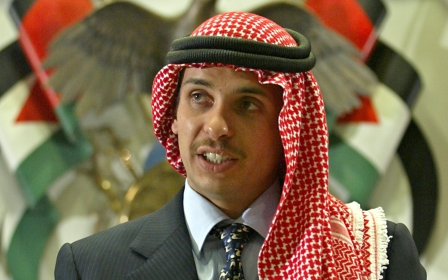Israel-Palestine war: Jordan's US-allied king faces 'nightmare scenario' as Gaza invasion looms
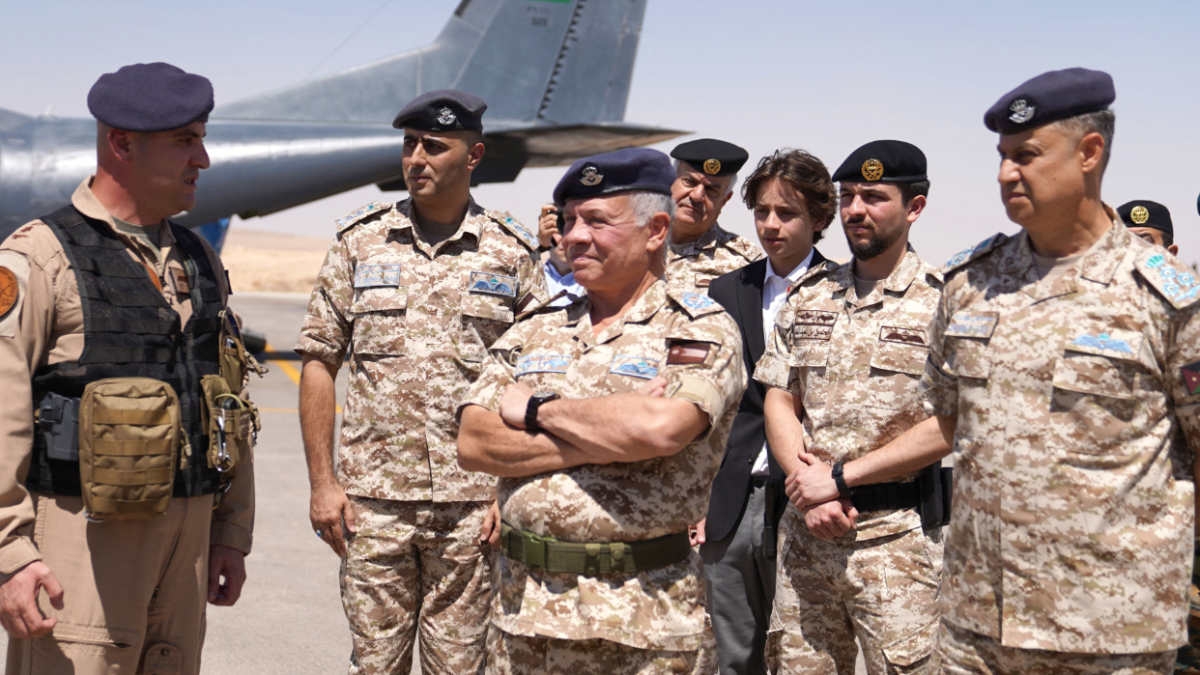
When Mossad agents poisoned a Hamas leader in Jordan in 1997, the country's king demanded Israeli Prime Minister Benjamin Netanyahu provide the antidote to save the group's chief. If not, Israel and Jordan's 1994 peace treaty would be imperiled and the Mossad agents who botched the attempt would be put on trial.
Twenty-six years later, Khaled Meshaal, Hamas' former leader, is alive and based in Qatar calling for protests against Israel and the Israel-Jordan peace treaty still stands.
Netanyahu is in power again, this time huddling with Israeli generals, planning a ground invasion of Gaza, while protests denouncing Israel and the US have engulfed Jordan's capital, Amman.
Pressure is building on Jordan's current US-backed King Abdullah II to move against Israel, as his father, the late King Hussein, did in the spat known as the "Meshaal affair".
At least 1,400 Israelis were killed during Hamas' attack on Israel on 7 October. As of Monday morning, more than 5,000 Palestinians have been killed, of which 2,000 have been children, in Israel's bombing of Gaza.
New MEE newsletter: Jerusalem Dispatch
Sign up to get the latest insights and analysis on Israel-Palestine, alongside Turkey Unpacked and other MEE newsletters
An estimated 15,273 Palestinians have been wounded in Israel's assault, with an additional 1,500 others, including 830 children, still unaccounted for, presumably trapped under rubble.
"Israel is laying siege to Gaza and has their finger on the trigger to kick out all the Palestinians," a former senior Jordanian military commander told Middle East Eye. "What more does it take? Everyone wants to see the peace treaty ripped up."
Calls for King Abdullah II - from the streets and in government - to sever ties with Israel underscore the tightening vice the monarch is caught in as the Israel-Palestine war enters its third week and fears of a wider regional conflict intensify.
"I'm worried about what's going to happen in Jordan," Bruce Riedel, a former Middle East analyst for the CIA and the author of Jordan and America: An Enduring Friendship, told MEE.
"King Abdullah is under tremendous pressure and has no good options."
'In bed with the Americans'
Squeezed between Iraq, Syria, Israel, the occupied West Bank and Saudi Arabia, Jordan prides itself on being a bastion of stability in a volatile neighbourhood.
Amman is one of the most US-friendly capitals in the region, the de facto city of choice for Western NGOs and Arabic language students alike.
Jordan's Hashemite monarchy receives about $1.6bn per year in aid from the US. At least 3,000 US troops are stationed at bases throughout the country where they partner with the Jordanian armed forces in "counterterrorism" operations.
Now, the country's normally soft-spoken diplomats are lashing out publicly against Israel, warning it not to take steps that amount to "a declaration of war", while the king has accused Israel - his peace partner - of committing a "war crime" by laying siege to the Gaza Strip.
Jordanian officials are trying to keep up with their people's rage.
Thousands of protesters gathered in Amman and throughout the country - in front of the US embassy in the upmarket suburb of Abdoun, and Israel's evacuated embassy - denouncing both US President Joe Biden and Netanyahu.
Last week, demonstrators clashed with security forces as they tried to storm the Israeli embassy. Others have chanted for Hamas to hit Israel with more rockets, waving the banned-group's flag.
A former Jordanian official, briefed by multiple government ministers, told MEE that if Israel launched an invasion of the Gaza Strip, it would be "a nightmare scenario" for the king, who is "more pro-West than half the leaders of Europe".
'No matter what the outcome of the war in Gaza, Hamas has scored a huge victory for the Islamists'
-Tariq Tell, American University of Beirut
"The perception that the US is giving Israel carte blanche to carry out what are regarded as war crimes, directs huge public anger to any Arab leader who is viewed as in bed with the Americans," a former senior Western official who was based in Jordan told MEE.
Those fears crystalised last week after a deadly strike on a hospital in Gaza that the Arab world, including Abdullah, blamed on Israel.
Jordan had to cancel a summit between the king, Egyptian President Abdel Fattah el-Sisi, Palestinian Authority President Mahmoud Abbas and Biden.
Jordan announced the decision unilaterally, but current and former US officials tell MEE the decision was closely coordinated with Washington amid fears that Biden's stop in Amman after visiting Israel could tip protesters over the edge.
"It was extraordinary the summit was cancelled. These things don't happen in Jordan," Tariq Tell, a professor at the American University of Beirut, who hails from one of Jordan's most prominent political families, told MEE.
"You would have to go back to 1991 and the first Gulf War to find a case of the Jordanian king wrapping himself in Arab nationalism like this," Tell added.
Biden's 'loyal friend'
Biden's unconditional support for Israel during the war is bitter for Abdullah, who welcomed the US leader's election as a reprieve after his tempestuous relationship with Donald Trump.
Abdullah was the first Arab leader to visit Biden at the White House. Biden was also quick to call the king in 2021 when Jordan was rocked by a sedition scandal involving Abdullah's half-brother.
At the time, Biden told his "loyal and decent friend" to "stay strong".
But Jordan has been warning the US about the risks of violence in the occupied West Bank and Gaza Strip since Netanyahu returned to power.
In a December interview with CNN, Abdullah said he was concerned about a "new intifada" and the "complete breakdown of law and order" in Israel and Palestine.
'Jordan expected more understanding from this [American] administration'
- Amer Sabaileh, Jordanian analyst
"Jordan expected more understanding from this administration on its fears," Amer Sabaileh, a Jordanian political analyst, told MEE.
"It's obvious the Americans don't want to listen. The main focus today is the green light to the Israelis to lay siege to Gaza."
Merissa Khurma, director of the Middle East Program at the Wilson Center, said there was "frustration in Amman that its warnings about the explosive situation in the occupied territories went unheeded", but that the US-Jordanian relationship remains "strong and strategic".
For Tell, an expert on political science in the Arab world, recent events have underscored Jordan's lack of agency as its main ally, the US, backs Israel.
"The king is a 'taker' in this war," Tell said. "He has to receive whatever the outcome of the conflict is and hope to manipulate the situation at home the best he can."
'Gaza dry-run'
People across the Arab world have turned out against Israel. What makes Jordan unique is not just the close relationship between the US and the ruling Hashemite family - whose cash-strapped government is dependent on US aid - but Jordan's demographics.
At least half of Jordan's population is of Palestinian descent. The first Palestinians came in 1948 after the creation of the state of Israel when they were forcibly displaced in an event known as the Nakba.
The Hashemite monarchy then annexed what is today the occupied West Bank and East Jerusalem, holding them until its defeat by Israel in the 1967 war. That conflict saw an additional 440,000 Palestinians flee to Jordan. Along with newer arrivals, Jordan is also home to 175,000 forcibly displaced Palestinians from Gaza who do not have citizenship.
'The Jordanians are terrified the Israelis are using Gaza as a dry run for the occupied West Bank'
- Former senior Western official in Amman
Many live in squalid and underfunded refugee camps, but the majority of Palestinians are integrated into society. Palestinians dominate Amman's business elite. Queen Rania, the king's wife, is Palestinian.
Riedel, the former CIA analyst, said that managing the war's fallout among his population was "perhaps the most difficult challenge Abdullah has faced in his 20-some years in power".
"The driving forces for the conflict - Hamas, Israel, Hezbollah, Iran and the US - are all out of his control," he said.
Jordan renounced its claims to the occupied West Bank in 1988. Six years later, King Hussein signed a peace deal with Israel as he backed the formation of an independent Palestinian state with East Jerusalem as its capital.
But Jordanian officials have long worried that Israel intends to annex the entire occupied West Bank and expel the Palestinians there across the Jordan River.
Those fears took on a dose of reality when Israel demanded the forcible displacement of 1.1 million Palestinians in northern Gaza last week, ahead of an expected ground invasion.
King Abdullah has said the forced displacement of Palestinians to either Egypt or Jordan is a "red line", while his foreign minister, Ayman Safadi, said it would be "an act of war".
"The Jordanians are terrified the Israelis are using Gaza as a dry run for what they can get away with in the occupied West Bank and East Jerusalem," the former senior Western official told MEE.
Jordan's embassy in Washington DC didn't respond to MEE's request for comment.
'No alternative to King Abdullah'
Besides Jordan's Palestinian population, Abdullah faces discontent with Israel among East Bankers, or descendants of the tribes that helped create Jordan after World War I.
'Everyone wants to see the peace treaty ripped up'
- Former Jordanian official
The Hashemite monarchy has historically sustained the tribes' support by a vast patronage network, doling out government jobs. Although that system is fraying amid an economic crisis, Jordan's security services and military are still dominated by East Bankers.
Solidarity with Palestine has now merged with worries that a new influx of refugees could stretch the government's creaking finances.
"The Transjordan section of the country has become even more radical against Israel than the Palestinians. They are more rejectionist," Tell said.
"Both communities, Palestinian and Transjordanian, realize that the 1994 Peace treaty hasn't offered a solution to the refugee issue. The logical conclusion is that the Palestinians are going to be settled permanently in Jordan," Tell added.
The former Jordanian official, an East Banker, briefed by multiple ministers said "they were pissed at having to defend their position in government" as Israel bombs the Gaza Strip.
To be sure, current and former Western officials who spoke with MEE said they see no threat to Abdullah's rule.
"The wealthy Palestinian elite and East Bank security services want to hold the country together - that means supporting Abdullah," the former senior Western official said.
The officials believe Abdullah can withstand calls from the street and in government to suspend or cancel the peace treaty with Israel, which they say would be an extreme step, cratering relations with Israel and jeopardising the strong bipartisan support Jordan enjoys in Congress.
Abdullah's ability to withstand criticism was tested when his half-brother, Prince Hamzah bin al-Hussein released a scathing rebuke against his rule claiming he had neglected the tribes. Abdullah cracked down on what his government said was a plot to destabilise the country and arrested his half-brother, further consolidating his power.
But Tell, an expert on Jordanian politics, said that Abdullah's sidelining of the military and traditional East Bank tribes also makes him susceptible to pressure.
"The guys at the top of the security establishment are an annex of the US and Israeli intelligence. The problem for the king is the middle ranks. They are by no means keen on Israel and the West."
Despite its leaders' tough rhetoric, Jordan continues to cooperate on security issues with Israel. Its neighbour has also avoided air strikes in the area of Gaza where a Jordanian army-run hospital is located.
Spillover
A former senior US official said the decision to allow protests is being carefully calibrated.
"Abdullah is giving people space to blow off steam, but he's drawing a red line that protesters can't go to the border," he said.
Jordanian security officials have stopped protesters from going to the border with the occupied West Bank. MEE has reported that some protesters have demanded the border be open so they can fight Israel.
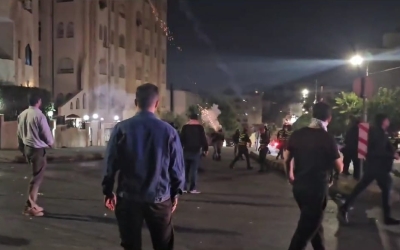
Khurma, at the Wilson Center, said the strong security presence was intended to limit the potential for a clash between Israeli soldiers and Jordanian citizens.
"Knock on wood, the border isn't porous, but if there was an exchange of fire it would be a serious security threat," she said.
One of Jordan's main fears is that fighting in Gaza could spread to the occupied West Bank.
Jordanian and Western officials tell MEE those concerns revive memories of the country's short lived civil war, known as Black September, when the kingdom expelled Palestinian fighters to Lebanon.
Despite rising tensions, fighting remains a distant possibility, officials say.
Jordan has yet to even recall its ambassador to Israel or declare the Israeli ambassador to the kingdom persona non-grata, a symbolic step given that Israel evacuated its embassy shortly after the war broke out.
Abdullah worries about 'huge Hamas victory'
The complaints against Abdullah that emerged during the Prince Hamzah affair could resurface now, experts say.
The king, who is half British, scores well at think-tanks and receptions in the West, but less so among Jordan's conservative tribes.
"The king has to sit down, drink coffee with these people and explain the pressure he is under," the former senior Western official said.
"But he is likely to confer with the CIA, his preferred American mediators and dispatch other family members to the tribes," the former official added. The task of soothing over the Prince Hamzah affair fell on the king's uncle, Prince Hassan bin Talal.
Fighting in the Gaza Strip also raises challenges to the Hashemite kingdom's legitimacy, which rests in part on their role as custodians of the Muslim and Christian holy sites in Jerusalem.
The king's call for a peaceful settlement to the Israeli-Palestinian conflict resulting in a two-state solution is now at risk of sounding hollow after Hamas' surprise attack penetrated an entire Israeli defensive line on 7 October.
Hamas led the attack that killed around 1,400 Israelis. Israel responded with a massive bombardment of the Gaza Strip that has killed more than 5,000 Palestinians, including 2,000 children.
"No matter what the outcome of the war in Gaza, Hamas has scored a huge victory for the Islamists," Tell told MEE. "In the context of a newly radicalised Middle East, that is what's really worrying Abdullah."
King Hussein was no friend of Hamas, but warily permitted some of the group's activities, as the Meshaal affair demonstrates. After ascending to the throne, one of his sons, Abdullah's, first acts was to enforce a ban on the group.
Israel would be doing Abdullah a favour by eliminating Hamas, the former senior US official said, but the backlash against a bloody invasion of Gaza could heap more pressure on the kingdom.
"Escalating social discontent, a massive gap in equality and an emboldened Islamic resistance is a combustible mixture for Jordan," Tell said.
This article is available in French on Middle East Eye French edition.
Middle East Eye delivers independent and unrivalled coverage and analysis of the Middle East, North Africa and beyond. To learn more about republishing this content and the associated fees, please fill out this form. More about MEE can be found here.


